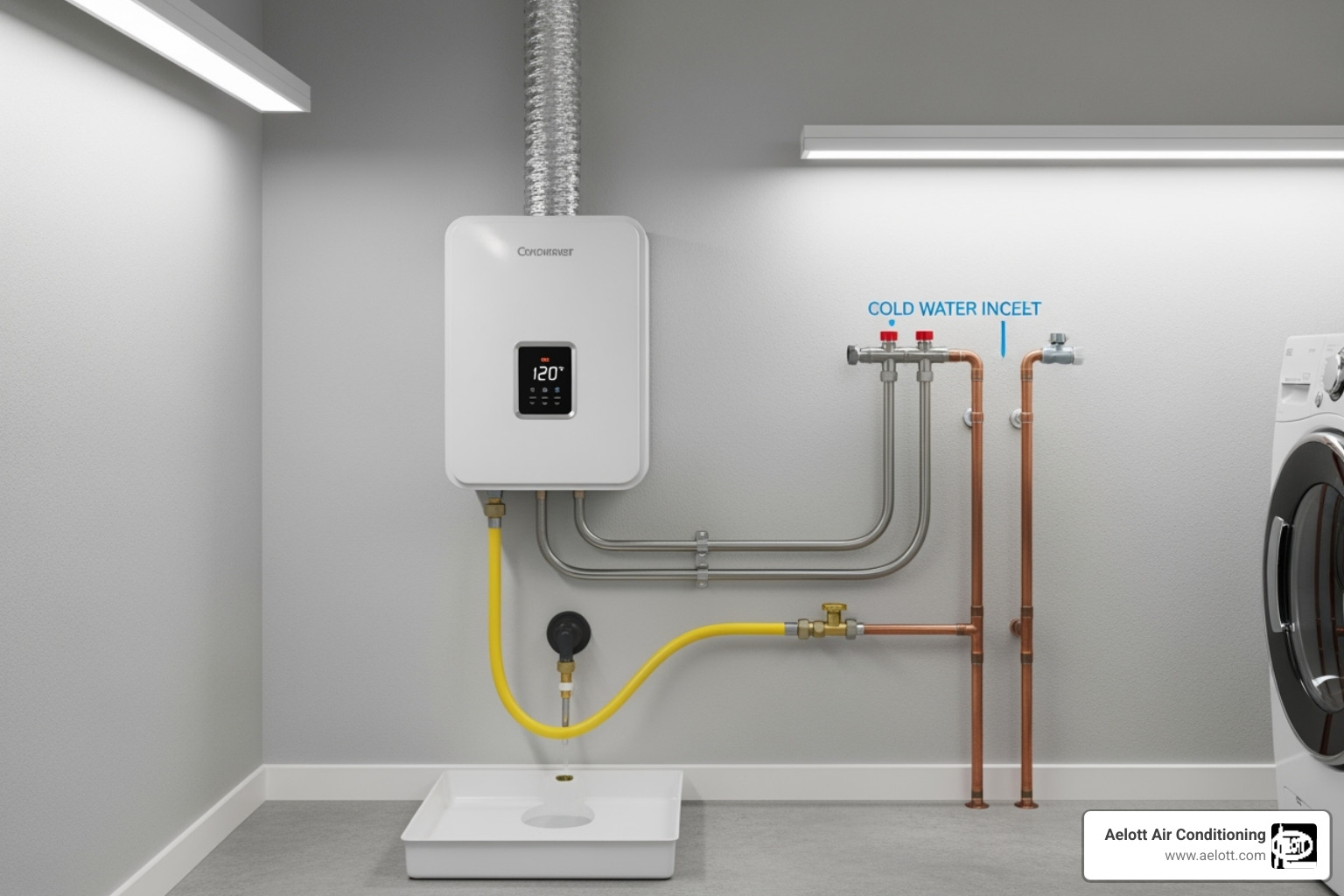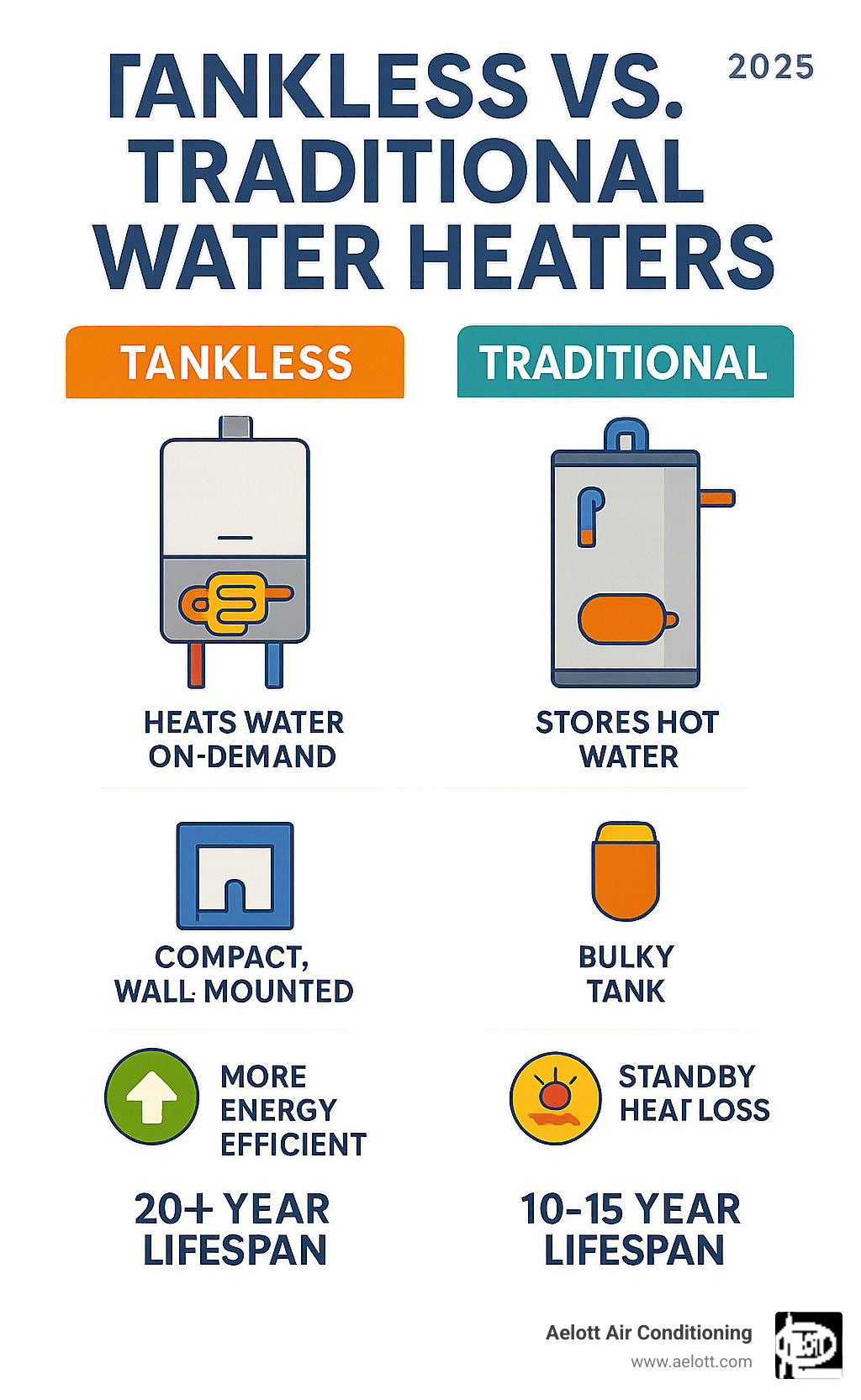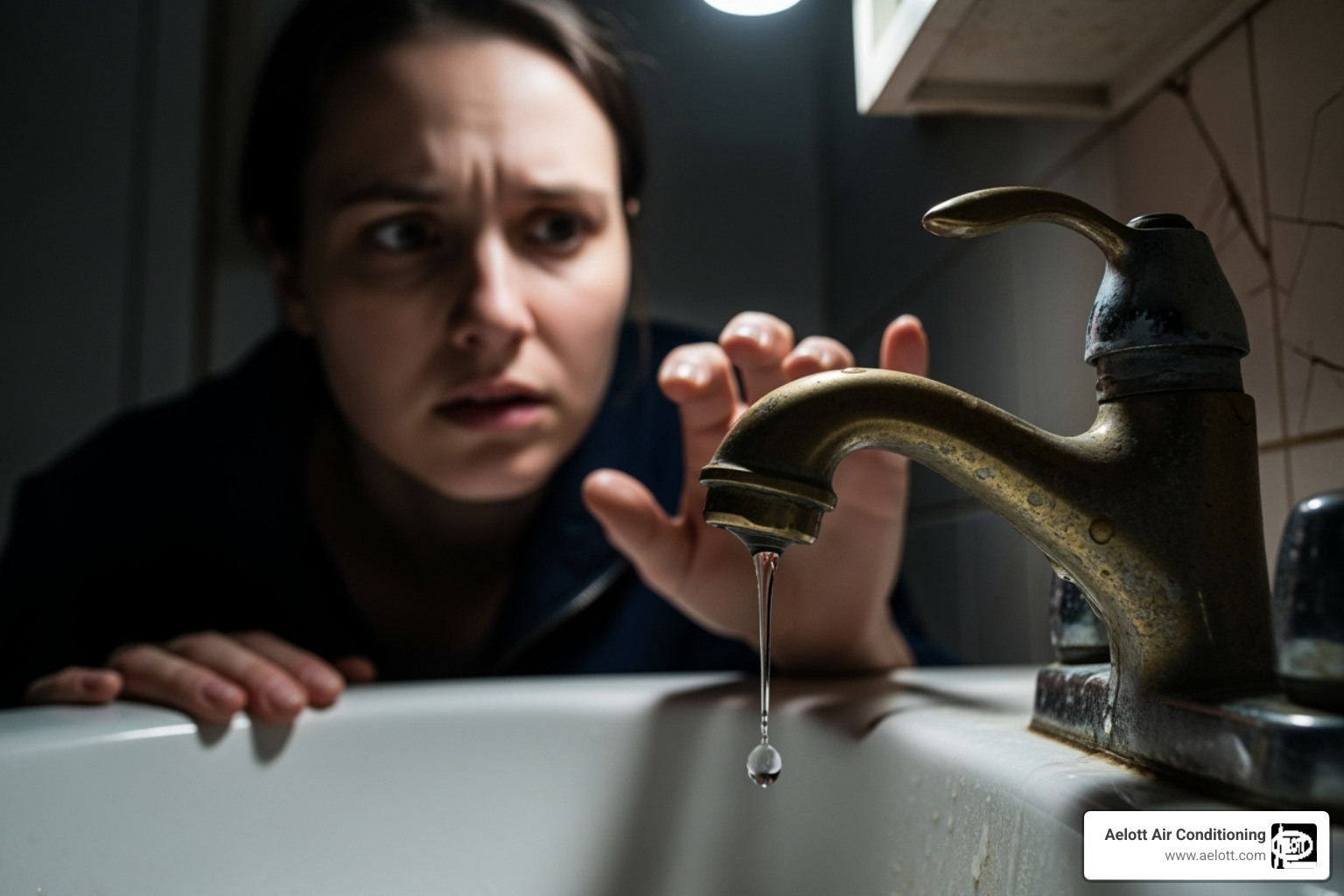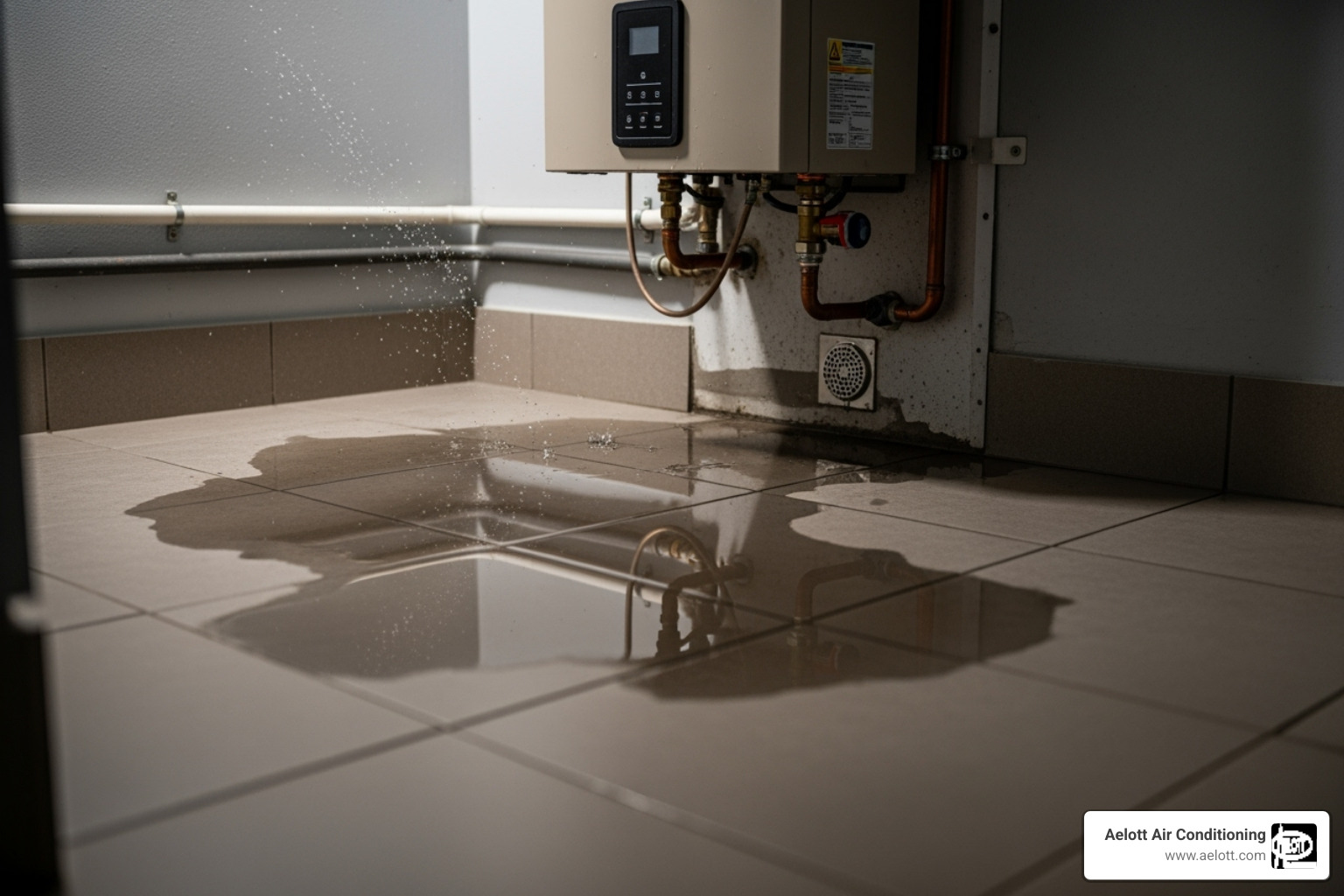.webp)
.webp)
Don't Get Left in the Cold: Troubleshooting Your Tankless Water Heater
Is your tankless water heater acting up? Learn common signs & DIY fixes, or get expert tankless water heater repair today!

Why Tankless Water Heater Repair Knowledge Can Save Your Day
When your tankless water heater repair needs arise, knowing what to look for and when to call professionals can mean the difference between a quick fix and costly water damage. These compact, efficient units heat water on-demand and can last 20+ years with proper maintenance - but they require different troubleshooting approaches than traditional tank heaters.
Common tankless water heater repair issues include:
- No hot water - Often caused by gas supply problems, electrical issues, or ignition failure
- Inconsistent temperatures - Usually indicates mineral buildup or overloaded capacity
- Unexpected shutdowns - Safety feature triggered by overheating or blocked vents
- Low water pressure - Typically from sediment buildup in intake/outlet lines
- Leaks - Can stem from loose connections, worn valves, or internal damage
- Strange odors or discolored water - Often indicates mineral accumulation or rust
When to call professionals:
- Gas leaks or electrical problems
- Internal component failures
- Complex error codes
- Major leaks or heat exchanger issues
DIY troubleshooting you can try:
- Check power and gas supply
- Clean air filters
- Clear blocked vents
- Reset the unit
As one homeowner finded, "A leaking tankless water heater can quickly go from being a small issue to a big problem. It can cause water damage, higher bills, and extra strain on your plumbing."
Understanding these basics helps you act fast when problems arise and know when it's time to call the experts.

Is Your Tankless Water Heater Crying for Help? Common Warning Signs
Picture this: you're looking forward to a relaxing hot shower after a long day, but instead of steamy bliss, you're hit with lukewarm disappointment. Or maybe you've spotted a mysterious puddle near your utility room that wasn't there yesterday. Your tankless water heater might be trying to tell you something important, and catching these warning signs early can save you from major tankless water heater repair headaches down the road.

Your tankless water heater is designed to be a reliable workhorse, heating water on-demand without the bulk of a storage tank. These space-saving units can last over 20 years and help you save money on energy bills. But like any hardworking appliance, they sometimes need attention.
Here are the key warning signs that shouldn't be ignored: lukewarm water that never gets quite hot enough, inconsistent temperatures that leave you guessing, unexpected shutdowns that interrupt your routine, low hot water pressure while cold water flows fine, leaks or pooling water around the unit, discolored or smelly water coming from your taps, and strange noises like banging or humming from the unit itself.
Fluctuating Water Temperatures
Nothing's more frustrating than the infamous "cold water sandwich" - when your shower goes hot, then cold, then hot again without warning. If your water temperature feels like it's playing games with you, your tankless unit is likely struggling with something.
Lukewarm water is often your first clue that trouble's brewing. This usually points to mineral buildup coating your heat exchanger, which is like the heart of your system. When minerals create a barrier, your heat exchanger can't transfer heat efficiently to the water flowing through.
Sometimes the problem is simpler - your unit might just be overloaded. If everyone's showering, running the dishwasher, and doing laundry at the same time, even the most capable tankless heater can get overwhelmed. But persistent temperature issues often signal heat exchanger problems that need professional attention.
Unexpected System Shutdowns
When your tankless water heater suddenly shuts itself off mid-shower, it's not being dramatic - it's actually protecting you. These shutdowns are usually a safety feature kicking in when the system detects something's wrong.
Overheating is a common culprit, especially when water flow is restricted or internal components aren't working properly. Your unit might also shut down if there's a blocked air intake or clogged exhaust vent. Gas tankless heaters need proper airflow for safe combustion and to vent exhaust gases outside.
Ignition failure is another reason your unit might call it quits unexpectedly. This can happen due to gas supply issues, dirty burners, or faulty ignition components.
Leaks and Drips
Even a small drip deserves your immediate attention. While tankless heaters are much less likely to flood your home than traditional tank units, they're not completely leak-proof.

Loose connections at water pipes are often the easiest fixes - sometimes just a gentle tightening does the trick. Worn valves can also cause leaks, particularly the pressure relief valve, which might drip occasionally but shouldn't create a steady stream.
More serious are internal leaks from a compromised heat exchanger. Mineral buildup and corrosion can eventually create weak spots that develop leaks. The pressure relief valve might also leak if there are pressure or temperature issues within the system.
If you spot any leak, your first step should be shutting off the water supply to prevent damage. Not sure how? Learn how to shut off your water supply with this helpful guide.
The good news is that many of these warning signs are your tankless heater's way of asking for help before small problems become big, expensive ones. Recognizing them early means you can often address issues with simple maintenance or minor tankless water heater repair rather than facing a complete system replacement.
A Homeowner's Guide to Basic Tankless Water Heater Troubleshooting
So, you've noticed some of these warning signs. Don't panic! While complex tankless water heater repair should always be left to the professionals, there are several basic troubleshooting steps you can take as a homeowner. Our goal is to empower you with the knowledge to identify simple issues and know when it's time to call in the cavalry.
Safety First: Before You Begin Any Work
This cannot be stressed enough: safety is paramount when dealing with any appliance connected to your home's electrical, gas, or water systems. Tankless water heaters use high voltage electricity (for electric models) or natural gas/propane (for gas models), both of which pose significant hazards if not handled correctly.
Before you even think about touching your unit, take these crucial safety precautions:
- Turn off electricity at the breaker: For electric tankless water heaters, locate the circuit breaker corresponding to your unit in your home's electrical panel and flip it to the "off" position.
- Shut off the gas valve: For gas tankless water heaters, locate the gas shut-off valve on the gas line leading to the unit and turn it to the "off" position. This is usually a yellow handle that you turn perpendicular to the pipe.
- Close the main water inlet valve: Locate the cold water inlet valve on your tankless unit (usually a blue or cold-colored handle) and turn it off. This will stop water from entering the unit and prevent leaks while you're working.
- Wear safety goggles: Protect your eyes from any potential splashes or debris.
- Wear gloves: Gloves can protect your hands from hot surfaces, sharp edges, or chemicals.
Never attempt to work on a water heater yourself if you're uncomfortable or unsure. Natural gas is flammable, and electricity can be deadly. When in doubt, call us.
Simple Fixes for Common Problems
Once you've ensured safety, you can proceed with some basic checks. These simple fixes might just be the tankless water heater repair you need, saving you a service call.
- Check power and gas supply:
- For electric units, ensure the unit is plugged in and check your circuit breaker. A tripped breaker can be as simple as flipping a switch to restore power.
- For gas units, ensure the gas valve is fully open. Sometimes, a partially closed valve can restrict gas flow and prevent proper operation. Also, check other gas appliances in your home to ensure there isn't a broader gas supply issue.
- Inspect and clean air filters: Many tankless units have air filters that can become clogged with dust and debris, restricting airflow. This can cause the unit to shut off unexpectedly. Consult your owner's manual for instructions on how to access and clean or replace these filters.
- Check for blocked vents: For gas units, inspect the exhaust vent pipe for any obstructions, such as bird nests, leaves, or debris. Clear any blockages you find. Ensure the area around the unit is free from anything that might block airflow.
- Reset the unit: Many tankless water heaters have a reset button. Pressing this button can sometimes clear minor errors and allow the unit to restart. Again, refer to your owner's manual for the exact location and procedure.
- Deciphering error codes: Modern tankless water heaters come equipped with diagnostic displays that show error codes when a problem arises. These codes are invaluable for troubleshooting. While we can't list every code for every brand here, your owner's manual will have a comprehensive list explaining what each code signifies and often suggesting a course of action. For example, a "flame failure" code might point to an ignition problem, while a "flow sensor" code could indicate a water flow issue. Understanding these codes is the first step in diagnosing many tankless water heater repair issues.
While these steps can resolve many common issues, some problems require a deeper dive. For more complex tankless water heater repair needs, or if you're still scratching your head after these basic checks, we encourage you to explore More info about our repair services.
Professional Tankless Water Heater Repair: When to Call the Experts
We've walked through some basic troubleshooting steps you can handle on your own, but let's be honest – some problems are simply beyond the DIY field. When it comes to tankless water heater repair, there's a clear line between what you can safely tackle and what requires a professional's expertise.
Here in Escondido and throughout North County San Diego, we've been helping homeowners with their HVAC and plumbing needs since 1963. In all those years, we've learned that knowing when to call for help isn't a sign of defeat – it's smart homeownership.
Gas leaks are an absolute emergency. If you smell that distinctive rotten egg odor or hear hissing near your unit, don't hesitate – call us immediately and leave the area. Natural gas is highly flammable, and even the smallest spark can be catastrophic.
Electrical problems fall into the same category. High-voltage electrical components can deliver deadly shocks, and improper handling can damage your unit or create fire hazards. If you're dealing with tripped breakers that won't stay reset, burnt wires, or electrical components that look damaged, it's time to step back and call the professionals.
Major leaks – anything more than a small drip – often indicate serious internal damage. When water is pooling around your unit or streaming from multiple locations, you're likely looking at heat exchanger failure or significant component damage that requires immediate professional attention.
Heat exchanger issues represent some of the most complex tankless water heater repair challenges. This critical component transfers heat to your water, and when it fails, it often requires specialized tools and expertise to diagnose and replace properly.
Complex error codes can be puzzling even with your owner's manual. While simple codes might have straightforward solutions, persistent or multiple error codes usually point to deeper system problems that need professional diagnosis.
For comprehensive Tankless Water Heater Services in Escondido, CA and surrounding areas, our licensed technicians bring decades of experience to every service call.
DIY vs. Professional: What You Can Handle and When to Call for Help
There's a satisfying feeling that comes with fixing something yourself. Cleaning an air filter or resetting your unit are perfect examples of homeowner-friendly tasks. These simple maintenance steps require no special tools and carry minimal risk.
But here's where we draw the line: anything involving gas lines, high-voltage electrical components, or internal parts should always be left to licensed professionals. We've seen too many well-intentioned DIY attempts turn minor issues into major, expensive problems.
Gas work requires specialized training and certification. Improper connections can lead to leaks, fires, or carbon monoxide poisoning. Electrical components in tankless units operate at high voltages that can be deadly. Internal parts like flow sensors, ignition systems, and heat exchangers require precise installation and calibration.
Beyond safety concerns, attempting complex repairs yourself can void your warranty. Most manufacturers specify that repairs must be performed by certified technicians to maintain coverage. What might seem like a money-saving move could end up costing you thousands if something goes wrong.
Our technicians undergo continuous training to stay current with the latest tankless water heater technologies. We're licensed, insured, and committed to following all safety codes and manufacturer specifications.
The Tankless Water Heater Repair vs. Replacement Dilemma
Every homeowner eventually faces this tough decision. Your trusty tankless unit isn't working quite right, and you're wondering: repair or replace? It's not always a simple answer, but we can help you think through the key factors.
Age matters significantly. Tankless water heaters typically last 15-20 years with proper maintenance. If your unit is approaching or exceeding this range, replacement often makes more financial sense than expensive repairs.
Repair frequency is another telling sign. If you're calling for tankless water heater repair service multiple times per year, those costs add up quickly. A unit requiring frequent attention is usually telling you it's reaching the end of its useful life.
Cost comparison requires honest evaluation. If repair costs exceed 50% of a new unit's price, replacement typically offers better long-term value. This is especially true for older units where additional problems are likely to surface soon.
Energy efficiency improvements in newer models can provide substantial savings. Modern tankless units are significantly more efficient than models from even five years ago. The energy savings alone might justify replacement, even if your current unit is repairable.
Our team provides honest assessments of repair versus replacement options. We'll never pressure you into unnecessary purchases – our reputation for honest pricing and dependable solutions has served us well for over 60 years.
For units beyond economical repair, explore our Tankless Water Heater Replacement services to find the perfect new system for your home.
Why Choose a Professional for Your Tankless Water Heater Repair Needs
When you're dealing with a malfunctioning tankless water heater, you want the problem solved correctly the first time. That's where professional expertise makes all the difference.
Accurate diagnosis is perhaps the most valuable service we provide. Tankless systems can exhibit similar symptoms for very different underlying problems. Our experience allows us to quickly identify the root cause, saving you time and preventing unnecessary repairs.
Specialized tools make complex repairs possible. Tankless units require specific diagnostic equipment, pressure testing tools, and calibration devices that aren't found in typical homeowner toolkits. We invest in the right equipment to service these sophisticated systems properly.
Guaranteed workmanship gives you peace of mind. We stand behind our tankless water heater repair work with a 100% satisfaction guarantee. If something isn't right, we'll make it right – no questions asked.
Safety compliance ensures your family's protection. We follow all local and federal codes for gas and electrical work. Our repairs meet manufacturer specifications and safety standards, protecting both your investment and your household.
Long-term solutions focus on more than just fixing the immediate problem. We identify potential issues before they become major failures, helping extend your unit's lifespan and maintain peak efficiency.
Since 1963, we've built our reputation on honest pricing and dependable solutions. We serve Escondido, Carlsbad, San Marcos, and throughout North County San Diego with the same commitment to quality that has kept us in business for over six decades.
Frequently Asked Questions about Tankless Water Heater Maintenance
Think of your tankless water heater like a trusty friend who just needs a little TLC to keep performing at their best. Regular maintenance isn't just a nice-to-have—it's the difference between decades of reliable hot water and unexpected cold showers at the worst possible moments.
How often should I get my tankless water heater serviced?
The sweet spot for tankless water heater maintenance is once a year. This isn't just a random recommendation—it's based on how these systems actually work and what they need to stay healthy.
Your annual service should include a thorough professional inspection and, most importantly, a complete flushing (also called descaling). Here in California, we deal with hard water in many areas, and those minerals are like tiny villains plotting against your tankless unit. They sneak into the smaller intake and outlet lines, coat your heat exchanger, and slowly but surely reduce your hot water pressure while turning your nice hot shower into a lukewarm disappointment.
Hard water impact is especially significant in our region. The mineral deposits don't just appear overnight—they build up gradually, and by the time you notice problems, they've already been causing damage for months. Regular flushing removes these deposits before they can cause serious issues.
Some homeowners in areas with extremely hard water might benefit from twice-yearly service, but for most of us, annual maintenance keeps everything running smoothly. This proactive approach can prevent many common tankless water heater repair issues before they start. For comprehensive care that covers all these bases, check out our Tankless Water Heater Maintenance services.
What is the difference between maintaining a gas vs. an electric unit?
While both types of tankless water heaters need that crucial annual descaling we mentioned, they each have their own personality quirks when it comes to maintenance needs.
Gas units require attention to their combustion components. During maintenance, we inspect the burner to ensure it's producing a proper flame—not too blue, not too yellow, but just right. We also check the vent system to make sure nothing's blocking the exhaust path (you'd be surprised how often birds try to make nests in there!). Gas models also have components like thermostats, gas valves, and thermocouples that need periodic inspection.
Electric units focus more on the electrical side of things. We examine the heating elements for signs of wear or mineral buildup and ensure all electrical connections are tight and secure. Sometimes issues can be traced back to something as simple as a tripped circuit breaker or power supply problems.
Both require descaling regardless of their power source—mineral buildup doesn't discriminate. Water is water, and if it's hard, it's going to leave deposits whether your unit runs on gas or electricity. Always follow your manufacturer recommendations since different models can have unique maintenance needs.
Can regular maintenance really extend my heater's lifespan?
Absolutely, and here's why this matters so much for your wallet and your daily comfort. Regular maintenance isn't just about keeping your unit running—it's about protecting your investment in a system that should serve you for decades.
Preventing mineral buildup is the biggest game-changer. When we flush your system annually, we're removing those sneaky mineral deposits before they can clog lines, reduce efficiency, or cause components to fail early. In hard water areas, this single step can add years to your unit's life.
Improved efficiency means your unit doesn't have to work as hard to heat your water. A clean heat exchanger transfers heat more effectively, so you get the hot water you want while using less energy. Over time, this efficiency translates to real savings on your utility bills.
Reducing breakdowns is where proactive maintenance really shines. During routine service, our technicians often spot small issues—a loose connection here, a valve that's starting to wear there—before they turn into major problems requiring extensive tankless water heater repair.
With proper maintenance, tankless water heaters routinely achieve a lifespan of 20+ years. Compare that to traditional tank heaters that typically last 10-15 years, and you can see why maintenance is such a smart investment. We've been servicing these units since 1963, and we've seen how well-maintained systems just keep going and going, providing consistent hot water and peace of mind for homeowners who take care of them.
Conclusion: Keep Your Hot Water Flowing Reliably

There's nothing quite like that moment when you turn on the faucet and perfect hot water flows out instantly. That's the beauty of a well-maintained tankless water heater, and with everything we've covered, you're now equipped to keep yours running smoothly for decades to come.
Remember those key takeaways we discussed: recognizing warning signs like fluctuating temperatures or unexpected shutdowns, knowing when you can safely handle basic troubleshooting, and understanding when it's time to call in the professionals for tankless water heater repair. These skills can save you from cold showers and costly emergency repairs.
The importance of maintenance cannot be overstated. Annual flushing and professional inspections are your tankless unit's best friends. They prevent mineral buildup, maintain efficiency, and help your system reach that impressive 20+ year lifespan. It's a small investment that pays huge dividends in reliable hot water and lower energy bills.
At Aelott Air Conditioning, we've been earning our neighbors' trust since 1963. Our decades of experience mean we've seen every tankless water heater challenge imaginable, and we know exactly how to solve them quickly and correctly. We believe in honest pricing – no surprise fees or unnecessary upsells – just straightforward solutions that get your hot water flowing again.
What sets us apart is our 100% satisfaction guarantee. We stand behind every repair, every installation, and every service call because your comfort and peace of mind matter to us. Whether you need routine maintenance, emergency repairs, or you're considering a full replacement, we're here to provide the dependable solutions you deserve.
Don't wait until you're dealing with a cold shower emergency! If your tankless water heater is showing any of those warning signs we discussed, or if it's simply time for its annual tune-up, give us a call. We're ready to help keep that hot water flowing reliably, just the way it should be.
Schedule your heating installation or service in Escondido, CA

Customer Testimonials
Go With Experience

HVAC Financing Available!
Get 0% Financing for 12 Months with Deferred Interest! Enjoy no payments and no interest on select plans.


Latest Blogs

.avif)
How to Run Your Furnace Efficiently: A Guide to Staying Warm This Winter








